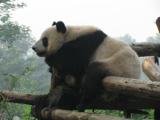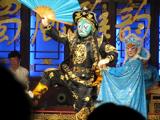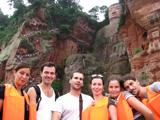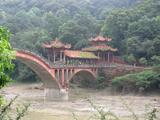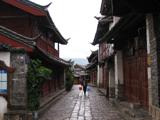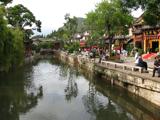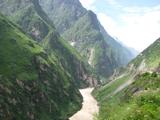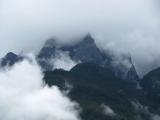From Chengdu to Hekou via …
Off to Chengdu to see giant pandas. There is a nice park area with a lake and lots of bamboo, where you can see pandas. We were a bit unlucky as the weather was so hot, the pandas were mostly inside or just sleeping, and we didn’t see the small ones playing. But we saw very tiny newborns, and all of the pandas were cute of course. The red pandas were a bit more active.
One evening in Chengdu we went to see Chinese opera in a traditional tea house. The singing wasn’t perhaps so much to our liking, but the mask shows were impressive, they changed the masks and even clothes incredibly fast. Other thing we really enjoyed there was a shadow play show by hands.
We got to try a local food speciality, hot pot, with some Brits who could speak some Chinese, so they took care of the ordering. Hot pot is a metal pot with normally spicy or very spicy stock inside. The stock is kept simmering at the centre of the dining table through the dinner. The ingredients are placed into the pot and cooked at the table. One can order different meats, fish and vegetables to be cooked in the pot. We got some interesting things on the table such as inside of a cows stomach and a full flat raw fish, which we cooked just like that: boiled in the pot. Interesting dish to try. Remember to order at least half of the pot less spicy (yingyang style), or prepare to sweat a lot! :) By the way Netta almost became vegetarian in China, as you never know how they serve you the meat. Might come with more fat than actual meat, or for example chicken is sometimes served with everything, skin, bones, liver etc. Mixed with noodles for example I mean, in pieces, not as whole.
From Chengdu we took another trip to see Le Shan giant sitting Buddha. It is the largest carved stone Buddha in the world (71 meters high). The place was packed with people, and it would have taken us over four hours to queue to go down to the feet of the statue. Instead, on top of paying the entrance fee to get next to the face of the statue we paid also a cruise to see the whole Buddha from the boat. In the same area is also a huge Sleeping Buddha statue. We didn’t see it as we got misunderstanding with this, plus to see it we would have had to pay a third fee. The cruise boat advertised that you can see the sleeping Buddha from the boat. But this was a joke to us as according to the Chinese, this is another sleeping Buddha, which is few islands that remind a sleeping Buddha. Whatever…
Via Kunming (where we applied for Vietnamese visa) we travelled to Lijiang traditional city. Very beautiful buildings, which can be fully enjoyed early in the morning when there is nobody in the streets. Later, the place transforms into market place full of tourists.
We noticed our mood regarding Chinese people changing daily. People were mostly extremely helpful, even with very limited English they were not afraid to try to help us with language issues. We even got our bus fare paid few times by a local just simply because they wanted to help and be nice.
Sometimes we felt like rock stars. Chinese find foreigners interesting looking, and many wanted to get theirs or their children’s picture taken with us.
But things that we got annoyed with included that Chinese are very loud. Netta even got convinced, that there must be a law in China that everyone has to get up at 6 o’clock, because every morning she woke up at that time for customers or the staff of a hostel/hotel talking loudly in the corridor. Or for car horns. The traffic in China is fairly chaotic, and the choir of horns never seems to stop. Chris wanted to buy one of those horns you use in sports events and to honk at every car which almost run over us on a walk way when we had green lights. We don’t know why traffic lights exist in some countries, seriously…
Also the habit of pushing other people and systematically passing them in a queue or sightseeing place did not get our understanding. Luckily spitting everywhere on the streets, hotels, trains etc. has been forbidden lately, so it doesn’t happen all the time anymore (although still very often). But really interesting to us was that small children don’t seem to wear diapers in China. They have a huge cut in their pants, so they can just do their thing on the street or on a train station floor… handy. Well, then again, it surely would be a big pile of waste if 1 billion people would all use disposable diapers…
After spending time mostly in crowded cities, it was absolutely wonderful to get to go for few days on the mountains, where there was no loud Chinese tourist groups. Chinese tourists travel only by bus, as they think walking is for peasants. We headed to Tiger Leaping Gorge, one of the deepest river canyons in the world, for a two day hike. We started the hike in Qiao Tou. In a group of six people, happily talking and nobody reading the instructions properly as everyone thought the other people did, we managed to get lost in the first hundreds of meters. Wondering and complaining about the bad sings on the route, we still kept going wrong way because the locals were showing us to go here and there. Locals want you to pay them to guide you, and unless you do, you cannot be sure about their instructions. Finally after few hours realizing we had to be on a wrong way we ended up paying few euros for a local old man to show us the way to the mountain hostel. The old man, probably in his 70’s was basically flying up the steep mountain wondering why young tourists need to rest every now and then. Makes you feel very good and fit you know… The hike and sceneries were magnificent. At times we had to pass waterfalls, which are formed on the path during the rainy season.
After the mountains we had to catch a bus back to Kunming and another one to Hekou, at the border with Vietnam, as our visa was expiring. The last bus run over night on a bumpy, curvy road, so forget about sleeping. At 7 am we walked cross the border. Good morning, Vietnam!
